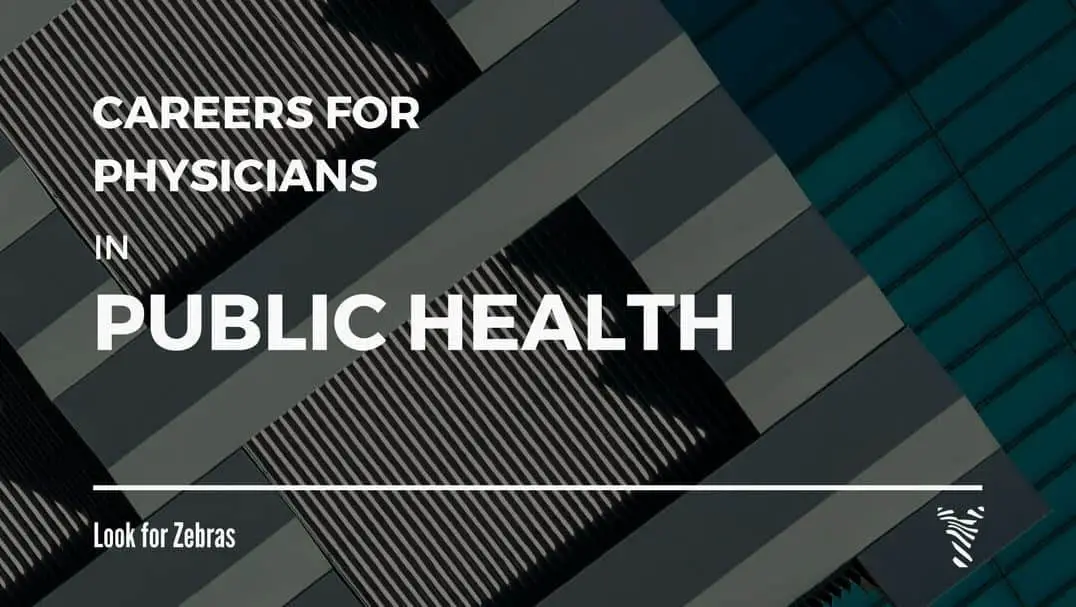Published by Lookforzebras
- Job Responsibilities
- Work Environment and Schedule
- Required Skills and Training
- Is This a Career for You?
Physicians or medical professionals with a strong interest in preventive health and working to improve patient health on a larger scale may enjoy a position in public health. By working at the population versus the individual patient level, a public health physician can help research and enact public health programming that will improve the health of the general public. There are a wide range of positions available in the area of public and population health including research, government health departments, organizations that contract with government organizations, health education, and others.
For those with interests in many areas within medicine, including health education, medical communications or writing, and community health, positions in public health may provide an avenue to combine talents and interests in a unique way, while still working to improve health outcomes.
|
| Medical Epidemiologist | Public health researcher |
| Example Duties |
▪ Identify public health concerns and determine the cause of outbreaks or health trends ▪ Study the effects of drugs or other exposures on segments of the population |
▪ Research in areas such as vaccines, health outcomes and quality of life, mental health, ▪ Examine social determinants of health and their role in disease |
| Example Employer |
▪ Public health department ▪ Hospital ▪ Laboratory ▪ University |
▪ Public health department ▪ University ▪ Government agency |
|
| Population Health Management |
Public Health Physician |
| Example Duties |
▪ Lower the cost per service through an interdisciplinary team model ▪ Use data-driven analytics to lower costs, improve care, and drive patient health participation |
▪ Administer healthcare consistent with public health priorities ▪ Implement programming including STI testing, vaccinations, etc. |
| Example Employer |
▪ Hospital ▪ Population health management organization | ▪ Public health department |
Job Responsibilities
Job responsibilities in the field of public and population health include positions in medical epidemiology, working in local public health departments or in administrative roles for public health programs, and as public health researchers in areas such as vaccination.
Various job responsibilities may include:
- Identifying public health concerns and determine the cause of illnesses, outbreaks, trends, or other findings
- Researching vaccines and other preventive measures
- Examining social determinants of health and their role in disease
- Lowering the cost per service through an interdisciplinary team model
- Administering healthcare consistent with public health programming priorities including STI testing, vaccinations, etc
- Using data-driven analytics to lower costs, improve care, and drive patient health participation
Work Environment and Schedule
The work environment of public health positions can vary widely. Administrative office-based positions, laboratory research positions, clinical preventive health positions, and field work in the areas of epidemiology and community health are all possibilities. Physicians can work in the area of public health in local health departments, conducting research at medical colleges or state universities, working for government agencies, or through non-profit and global health work.
The majority of the positions in public and population health may involve a standard work week, consistent with 8 to 5, but could include non-traditional hours as a result of community events or programming. Travel could also be required as a part of research or continuing education.
Required Skills and Training
Many, but not all of these positions, will prefer or require a degree in public health, such as an MPH. Many physicians, via the nature of their previous positions, will informally have some experience in public and population health and should not have a problem obtaining a position in many areas in the field.
Required skills include:
- Knowledge of biostatistics, epidemiology, and public health principles
- Knowledge of clinical medicine, healthcare management practices, and policy development
- Logical thinking skills and capability to review and interpret data
- Good written communication skills
Residency, Licensure, and Training Requirements
Board certification and licensure are required for some positions, but not all. A degree in a public health-related field, such as an MPH, is often generally preferred.
Some research positions, such as those working in vaccine research, bioterrorism research, or other specialized areas such as infectious disease may prefer PhD-level training in subjects such as microbiology, immunology, virology, genetics, or other medically-related sciences. To work for health departments, hospitals, or other entities on improving patient outcomes and population health measures, most physicians with a working knowledge of public health and practice management would likely not need more training.
Is This a Career for You?
Physicians with an interest in serving as a type of public health officer, investigating public health concerns and notifying the public of health and safety concerns may find a career in public health very satisfying. Instead of advising patients on an individual basis, these physicians protect the health of the population at large by investigating health crises and developing health models and public health initiatives to prevent disease.
Often, physicians who work in public health are drawn to the field because they feel passionate about improving overall population health. Similar to clinical medicine, physicians and public health officials can overwork themselves attempting to make changes that will improve the lives of their patients or the general population. Public health work requires an individual that is dedicated, willing to push past barriers in lack of funding, access to care or support, and has ingenuity and compassion to carry them throughout their career. It can be an incredibly rewarding career, but often one where the fruits of your labor are not felt right away, so patience and persistence are key.
Governmental and Public Policy
Public Health and Population Medicine
Global Health and the Not-for-Profit Sector
Utilization Management and Managed Care
Business Consulting and Management Consulting
Scientific Design and Illustration
Scientific and Regulatory Writing
Clinical Trials and Drug Development

